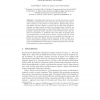Free Online Productivity Tools
i2Speak
i2Symbol
i2OCR
iTex2Img
iWeb2Print
iWeb2Shot
i2Type
iPdf2Split
iPdf2Merge
i2Bopomofo
i2Arabic
i2Style
i2Image
i2PDF
iLatex2Rtf
Sci2ools
121
click to vote
EDCC
2005
Springer
2005
Springer
Failure Detection with Booting in Partially Synchronous Systems
Unreliable failure detectors are a well known means to enrich asynchronous distributed systems with time-free semantics that allow to solve consensus in the presence of crash failures. Implementing unreliable failure detectors requires a system that provides some synchrony, typically an upper bound on end-to-end message delays. Recently, we introduced an implementation of the perfect failure detector in a novel partially synchronous model, referred to as the Θ-Model, where only the ratio Θ of maximum vs. minimum end-to-end delay of messages that are simultaneously in transit must be known a priori (while the actual delays need not be known and not even be bounded). In this paper, we present an alternative failure detector algorithm, which is based on a clock synchronization algorithm for the Θ-Model. It not only surpasses our first implementation with respect to failure detection time, but also works during the system booting phase.
Applied Computing | EDCC 2005 | Failure Detector | Perfect Failure Detector | Unreliable Failure Detectors |
Related Content
| Added | 27 Jun 2010 |
| Updated | 27 Jun 2010 |
| Type | Conference |
| Year | 2005 |
| Where | EDCC |
| Authors | Josef Widder, Gérard Le Lann, Ulrich Schmid |
Comments (0)

